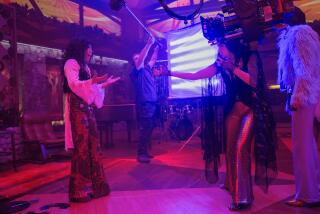STAGE REVIEW : ‘ALICE’ FOR ADULTS IS A WONDER
- Share via
It is an adult pleasure: the rediscovery of a thing once enjoyed, half-forgotten, newly seen through the perspective of time. Such a pleasure can be found in the Mark Taper Forum’s literary cabaret offering “With Alice in Wonderland” at the Itchey Foot Ristorante.
Written by James R. Winker and Diana Maddox, this adaptation of “Alice in Wonderland” takes its audience on a return trip filled with pungent literary delights.
Deftly performed by Winker, simply directed by Raye Birk, the performance is a rare introduction to the classic for older children as well, who may only know Alice courtesy of Walt Disney.
It also, through intriguing asides between selected chapters, explores Charles Lutwidge Dodgson, the complicated, controversial Victorian figure who wrote under the name of Lewis Carroll.
Winker, angular and sharp-featured, is a gifted storyteller, skillfully elucidating Carroll’s clever absurdities. (Thoughts of Monty Python may cross the mind.)
His whimsical delineation of Carroll’s characters, combined with an ascetic appearance and a somewhat formal stance on the small stage, forms a subtle, intimate bond with the author, whose “Alice” began as tales told to a favorite audience--little girls.
Winker tells us that after the works of Shakespeare, the “Alice” books are those most often quoted. They have been translated in myriad languages--including Swahili--interpreted and produced in all ways conceivable.
But Carroll and his works have also been a Freudian’s playground. Winker quotes Alexander Woolcott as having said, prematurely, “everything has befallen the Alice books except psychology.”
In the ‘30s, a leading American psychiatrist considered “Alice in Wonderland” so fraught with disturbing symbolism that he urged it be banned as children’s reading.
Other analyses describe Carroll’s imagery as “Oedipal,” “oral,” “excremental” and “phallic.”
The conflicting negative opinions, both objective and subjective, are dismissed by Winker, who points out, with some oversimplification, that “as far as we know, (Carroll’s) life was sexless, uneventful and happy.”
Winker paints a sympathetic portrait of an intensely private man of great accomplishment, an author, logician and Oxford mathematician, who also was one of the pioneer photographers of the Victorian age.
A crippling stammer led Carroll to give up lecturing, but apparently no such affliction tormented him when he regaled many child friends with his unique nonsense.
In a poignant reading of “Alice in Wonderland’s” last paragraph, Winker seems to illuminate the psyche of a complex man who sought peace by retreating into the safe childhood of others.
Carroll’s wistful, self-conscious conclusion imagines Alice as a woman with children of her own, finding “pleasure in all their simple joys, remembering her own child-life and the happy summer days.”
Performances continue through Feb. 22 at 801 W. Temple St. This Sunday and Feb. 22, curtain is at 5:30 p.m. and on Feb. 15, it’s at 1 p.m. (213) 972-7231.
Winker
More to Read
The biggest entertainment stories
Get our big stories about Hollywood, film, television, music, arts, culture and more right in your inbox as soon as they publish.
You may occasionally receive promotional content from the Los Angeles Times.










